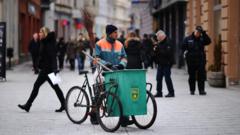In Sarajevo, a troubling resurgence of rat populations is linked to a rise in rat-borne diseases, particularly leptospirosis. Residents have taken to social media to document the overwhelming presence of rodents, often spotted swimming in the Miljacka River, alongside overflowing rubbish bins and cases of illegal dumping. The lack of effective waste management and pest control has created an ideal environment for rats to flourish, raising concerns among health officials.
In one alarming instance, the largest hospital in the city reported a dozen new leptospirosis cases in just 24 hours, indicating an urgent public health threat. Leptospirosis, also known as rat fever, is a disease transmitted through water or soil contaminated by rodent waste, with symptoms ranging from mild headaches to severe complications like kidney failure.
In response, local authorities have declared an epidemic, launching immediate cleanup operations to mitigate the spread of disease. Extra municipal workers equipped with disinfectants have been deployed for an extensive clean-up of public areas, while schools are instructed to sanitize play areas and check for rodent infestations. This prompt action marks a significant shift from over two years of lax pest control, attributed to a failed tender process for sanitation work.
Sarajevo Canton Health Minister Enis Hasanovic characterizes the situation as a communal crisis, underscoring the local government's failure to uphold essential hygiene standards. Former hospital director, Sebija Izetbegović, warns that without swift interventions, the rodent population could proliferate further, raising the risk of diseases such as hantavirus.
Fortunately, the lepto epidemic has not yet resulted in severe cases, but the mortality rate can exceed 50% in untreated severe instances. The combination of ignored municipal duties and surging rat populations indicates a pressing need for systemic improvements in public health management to safeguard the wellbeing of Sarajevo's residents.






















